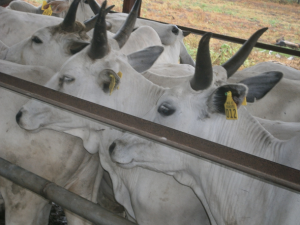HOW NIGERIA CAN USE BIOTECH TO IMPROVE LIVESTOCK & ACHIEVE FOOD SECURITY
The global human population has been on the increase in the last 30 years with developing countries getting a fair share of the growth. Nigeria currently has a population of over 181 million people and is projected to hit 400 million by 2050 as the third largest country in the world, only behind India and China. In this write-up, NKECHI ISAAC examines how Nigeria can use emerging technology, biotechnology, to improve livestock production and enhance food security.
As the population grows, it exacts a lot of strain on the nation’s food supply chain, stressing the need for instance to improve livestock production to carter for the nutritional need of the growing population.
Livestock, which is a key source of animal protein, is very important in the food supply of rural and urban areas as well as family nutrition, providing the critical mass with the protein necessary to combat malnutrition and drive a productive population.
This was the core issue of the livestock genomics workshop 2019 with the theme: ‘Genomics Data Analysis: Tools, Methods And Trends,’ organised by the Center for Genomics Research and Innovation (CGRI) of the National Biotechnology Development Agency (NABDA) held recently in Abuja.
Speaking exclusively on the issues of the day, the director, Genetics, Genomics and Bioinformatics Department, Dr Nash Oyekanmi, said the workshop was organised to teach participants from different universities, research institutes, government research agencies, lecturers as well as post graduate students already involved in livestock research, to use biotechnology to add value to livestock by improving its genomic qualities.
He said scientists at the center had been able to sequence and study the genetic characteristics of three unique cattle varieties in the country with a view to improving the breeds for better production to cater for the nutritional value of Nigerians, pointing out that the workshop would enable the agency train other scientists in different fields to build the critical mass needed to carry on the research.
Similarly, the assistant chief scientific officer at the center, Dr Tyjani Abdulfatai, said the training was targeted at providing enough protein to promote national food security in Nigeria;
“We’re increasing in population in Nigeria, even globally. CGRI’s effort to contribute to increase in food production, that’s meat protein and even agriculture generally is now latching on a research called genomic improvement of our indigenous livestock to enable them improve their productivity in terms of milk production and meat and also milk resistance. This will contribute to more food, increase the livelihood of rural people, farmers in the rural areas. We identified genomics approach as a revolutionary technique used to improve livestock. So, we’ve taken a step after preliminary studies to start this programme and invite other agencies who have similar mandate or working in similar areas to collaborate with them and train them on genomic approaches to be able to study our indigenous animals to be able to find genes responsible for their adaptation and that can be used in genetic improvements.”
A research officer from the center, Adijat Jimoh, also underscored the importance of improved livestock varieties to feed the nation;
“At present, we have increased demand for food, we haven’t done the real genetic studies on our indigenous breeds to meet that demand but if we do this and we’re able to improve them genetically maybe overtime we can do genome editing and take our breeds to the next level to make the capacity of milk and meat we have more proficient, double production tremendously.”
Another participant, Dr Stephen Shaida, from the Vector and Parasitology department, NITR, pointed out that knowledge garnered from the workshop could be applied for the control of tsetse flies as well the enhance the health status of our livestock;
“Many ways this workshop can really help this country in terms of food security not only in trying to improve the breeds of cattle alone but the knowledge that would be acquired in this workshop could also be applied in the studies of the vectors that cause these diseases, particularly tsetse flies. We have 11 different species out of 22 so far described in Sub Saharan African.
“Before now, a lot of researchers had to travel abroad to acquire this knowledge but we thank God that things are improving now and with this kind of workshop being held here, people and data are safe because apart from the resources that people spend in travelling abroad just to acquire similar knowledge, this has been brought home and it’s going to save the country a lot of capital flight because people do not need to travel abroad now to acquire this knowledge. I think it is a welcome development.”
Earlier, the director-general of NABDA, Prof Alex Akpa, said it would be very easy for participants to build on their expertise during the training as most of them were already involved in livestock research, adding that the experience and the expertise they would acquire would be useful to them and the country over a very long time to come.
“NABDA as an agency is fully behind this training programme and at the end of the day, we’ll like to partner each of you as much as possible so as to build the critical mass of scientists in this highly specialised area of study,” he added.
In his remarks, the director of Bio-resources Technology Department at the Ministry of Science and Technology, urged participants to fully utilise the opportunity of learning from the best in the country. He stressed that, apart from building their proficiency, participants also have a vital role in ensuring food security by utilizing experience garnered from the workshop for national development.
Source: Leadership News

